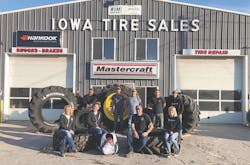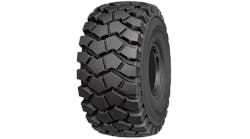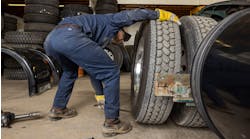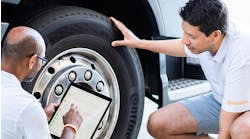Iowa Tire Sales Helps Keep Growers in Their Fields With Top-Notch Service
“I love this end of it,” he says. “The people thank you when you get them up and going because that’s their livelihood, too. Honest to God, I feel good getting that big machine up and moving.”
Howard grew up around tires that, as he says, “needed to be fixed.” His grandfather, Frederick Turner, known to all as “Bus,” opened Iowa Tire Sales in Fairfield in 1941. His grandfather was making money in the tire industry “when nobody was,” says Howard. During World War II, Turner would take two straight trucks to the Cooper plant in Findlay, Ohio, where he would “dig through the seconds pile, bring the tires back and sell them.”
For four decades, the shop offered mainly automotive repair and passenger tire sales and service. Then, in 1985, Turner hired his grandson. Although just out of high school, Howard was not afraid to think big when it came to the shop. He talked his grandfather into buying a service truck to expand their service offerings to local farmers. “I blew it up,” he says of his grandfather’s tire store.
Turner died in 2000, and Howard bought the store in 2005. Howard’s father and other family members did not share his enthusiasm for tires. “I ended up buying out everybody and standing on my own,” says Howard. “I’m loyal to it; I’ve never done anything else.”
Today, Iowa Tire Sales sells and services passenger tires, commercial tires, forestry, industrial and agricultural tires. In addition to automotive service, Iowa Tire Sales offers round-the-clock mobile tire repair for passenger vehicles as well as commercial, industrial and farm customers.Many family members work at the shop. Howard’s wife, Betty, and daughters, Kassie and Sydney, work in the office. His cousin, John Mineart, handles alignments, and his uncle, Gary Reneker, is a service tech. Granddaughter Scarlett, born in June 2017, is the office helper and the first grandchild in the Howard family. (The Howards also have a son, Turner, who works for a local farmer.)
There are three passenger tire technicians, Corbin Kissling, Jeff Thomas, and Tyler Krumboltz. The ag tire tech is Austin Gire. The shop has four service bays, and new ag tires are stored in a 13,000-square-foot building.
The ag side of the business accounts for well over half of Iowa Tire Sales’ revenues. Growers in a 100-plus-mile radius around the store are Howard’s customers. They require service at all hours, and Howard provides it.
“You do what you say you are going to do. If you say you are going to be there, be there. If you’ve got a hiccup, explain it to them,” he says.
It’s a fast-paced environment, says Howard’s daughter, Kassie. “My dad works very, very hard every day. During the busy season, he works seven days a week. I think we’re so busy because dad treats his customers very well. The ag business is all he has time for anymore, and we take care of the rest.”
Howard understands the threat a tire failure can pose to a grower’s efficiency, productivity and profitability. Keeping equipment going is a grower’s priority, especially during planting or harvesting time. To keep growers in their fields, Howard has three boom trucks and two smaller trucks to service their needs on site, whether along the road or the middle of the field.
Just 30 years ago, growers’ service expectations were very different. “Back in the eighties, farming was just what people did to survive. Nobody would throw a million dollars’ worth of ag tires on inventory,” says Howard. “Farming is more of a commodity now. Farmers can get a crop in and a crop out in no time.”
Tires from PLT to OTR are on a farm
In Batavia, about 20 miles away from Howard’s store, Shawn Adam is an equal partner with his father, Nick, and brother, Jeff, in Triple A Farms GP. They cultivate about 7,500 acres of row crop and raise 20,000 hogs annually. Says Shawn: “We’ve had instances where we’ve had blown tires at the side of the road. Jeremy can have us up and moving again in hours where it might take us all day. It’s just like in any business, time is money and you’ve got to be most efficient as you can. He can fix tires and get me rolling a lot faster than I can because he’s got all the equipment to handle it.”
Three combines run virtually nonstop in Triple A Farms’ fields during the fall harvest. The family has five trucks for hauling grain and facilities for storing about 700,000 bushels of grain on their farm. They do all herbicide spraying and dry fertilizer application themselves. The family also has a trucking and construction business, Adam Valley View Farms Inc. “We do pretty much everything here in-house,” says Adam. “We’ve got vehicles with commercial truck tires, ag tires, pickup tires, car tires. There’s a lot of diversity in our business.”
An overlooked farm technology
Triple A Farms uses agriculture technologies to improve yields and reduce environmental impacts while saving time and money. For example, the tractors are equipped with an automated steering system called RTK, which is short for real-time kinematic. RTK is a type of precision farming technology that allows growers to access the most accurate global positioning system (GPS) signal available.
The RTK signal provides information that is accurate to within one inch of a farmer’s location. The sub-inch GPS data is critical to efficient farm operations, such as running a row crop tire down the same rows. The tractor guidance and steering system also enables Adam to precisely apply seed and fertilizer to his fields any time day or night.
Tires may be the most undervalued on-farm technology for boosting yields and profitability as well as benefiting the environment. “Tires are probably the most overlooked piece of equipment on most farms,” says Adam. “Everything starts from the ground up, just like your seed. If you haven’t got something good in the ground the day’s not going to amount to much. You can have the biggest horsepower tractor, but if you don’t tie it to the ground with the right tires, the horsepower doesn’t make any difference.”
Adam says “cheap, ineffective” tires just limit a tractor’s capabilities. “Everything is measured by time. An hour on a tractor costs so much, especially on these late-model tractors. So the more efficiency you can get out of that piece of equipment, the more money you’re saving yourself, the more time you’re saving yourself, the more you can get done.”
Another technology essential to precision agriculture is variable rate technology which determines when, where and how much seed or fertilizer to apply. “We are big into precision farming,” says Adam. “We variable rate all of our fertilizer, all of our planting, all of our seeds. We try to maximize every bit of the operation we can.”
Utility terrain vehicles (UTVs), or side-by-sides, “are a must” on the farm, says Adam. One of his four side-by-side vehicles is equipped with GPS. “All of our fields are grid stamped. We pull 30 soil samples to send to a lab to have analyzed according to GPS coordinates. Then all of our tile inlets, which take surface water underground, are geo-referenced. We have a side-by-side outfitted with GPS equipment and monitors so we can locate tile lines and tile inlets right from that machine.”
$300,000 worth of tires
Adam’s investment in agricultural technology is significant. So is his investment in tires. Adam estimates he has close to $300,000 worth of tires on his farm. Howard works closely with Adam to get tires that are best suited for his equipment and the application.
“Jeremy keeps me up-to-speed on the latest and greatest stuff,” says Adam. “I’m not a tire professional by any means. If I’ve got questions, Jeremy is very knowledgeable, and he’s not arrogant to think he knows everything. If he doesn’t know something, he tells me he’ll get back to me and he follows through.”Adam also tests tires for manufacturers. “We’re open to work with any tire company. We’re willing to try to figure out what works and what doesn’t.” He recently completed a test of a low-pressure, high-clearance sprayer tire, the 363, for road and field use from Alliance Tire Americas Inc. “After the Alliance test, I told them my thoughts on the tire. We had been running a competitor’s premium tire. I have the Alliance tires on my sprayer today because of that testing.”
An overinflated tire on any size farm vehicle or implement is inefficient and inefficiency is expensive, according to James Crouch, marketing specialist for Alliance. “The most important thing is to make sure the air pressure is set right, and that’s something we worked out with Jeremy and Shawn,” he says.
“If the air pressure is too high, fuel economy goes down. And some of these giant tractors doing tillage work burn 24 to 30 gallons of diesel fuel an hour. If your tires are overinflated and you’re wasting, say, 6% fuel economy due to over-inflation, that’s a lot of money.”A relationship-driven business
Selling and servicing agricultural tires is “a relationship business unlike any other,” says Crouch.
“Farmers normally don’t beat up the tire dealers they truly rely on over price. It’s about service, accessibility and responsiveness. The relationship between a farmer and a tire dealer is the best relationship you’ll find, and that’s why it’s profitable.”
Crouch says the profit margins on ag tires are greater than those of passenger and commercial truck tires. “The farmer relies on the dealer. The dealer has to be profitable so the farmer can call on him at 3 a.m. during combine season.”
The high-service requirements also preserve ag tire sales from online competition. Says Howard: “I don’t think the internet will be able to take over because customers have to have the service.”
Three boom trucks help Howard provide the 24/7 service his customers need. He operates one, an employee operates another, and the third is a spare. “Jeremy has made a giant investment with the boom trucks because those things are just crazy expensive,” says Crouch. “But he made a giant investment to grow his business and better serve his customers.”
The boom trucks enable Howard to be fast and safe when handling tires weighing several hundred pounds and cast iron wheel weights weighing up to 1,100 pounds.
“Tires and the wheel weights are extremely heavy and dangerous,” says Crouch. “He’s actually able to stand at his boom truck and move the tire to the machine or do anything he needs to do with the tire without being near it. It makes his operation much safer, which is a huge benefit to him, and it also allows him to be faster. If it’s the middle of the night and a combine goes down, Jeremy can fix it faster than other dealers without such equipment.”
While working for another manufacturer, Crouch spent two years in ag tire sales in Iowa where he saw the relationship-driven nature of the ag tire market firsthand.
“The areas where I had the strongest market share, the strongest presence are the ones where I had dealers like Jeremy who had first-name relationships with the farmers in the area. The farmers trust him; he trusts me; and farmers talk. It’s a giant relationship spiral.”
The relationship starts with the manufacturer and the dealer. “If the dealer can’t trust the manufacturer to stand behind what they say, then there’s no reason for the dealer to sell the tire. So if the dealer trusts the manufacturer’s rep, it just spreads. The farming industry is so communal that if you have a farmer like Shawn who trusts the product, who likes the product and likes the service they get from the dealer and the manufacturer’s rep, they tell other people,” says Crouch.
A lot of the profit is not in the first sale, according to Crouch. “The service is not cheap. If you’re good at it people will pay for it, and they pay Jeremy. He’s got a great business because he provides very good service. There’s margin to be made on service over the life of the tire.”
Guarantee their uptime
The relationship between dealer and grower begins with a single service call. “You prove yourself with one machine, and every farmer has more than one machine, you get a shot at something else. You might not have sold the tire initially as it came brand new on the machine, but now you get a chance to make margin on the service.”
Howard’s operation is a little different because of its small size. “It’s just Jeremy,” says Crouch. “Jeremy is the point of contact for every farmer in six counties. But for a larger dealership with assigned salespeople, the relationships still matter. If you hire a new salesperson, but one of your current salespeople has a relationship with a farmer, they are going to have to maintain that relationship and not give it to someone new because someone new may not fit as well. It’s all relationship-based,” says Crouch.
Ag tires are very application-specific, which is a challenge for farmers. “One tractor can do 10 different things in the same year. You have to make sure the tire that’s on that machine and the air pressure you have in that tire is accurate for all of those applications. It’s a really difficult thing to do,” says Crouch. “A dealer like Jeremy who has educated himself on what’s available and what works in what application is a huge benefit to any farmer.”
Even a small farming operation offers many opportunities for a tire dealer. Says Crouch: “There are several pieces of equipment on a dairy or a livestock operation outside of a tractor. Every farmer has a skid steer and skid steers melt through tires.”
Crouch says ag tire sales do not pigeonhole a dealer into tractor tires. “When you walk on a farm, you notice there are dozens of pieces of equipment in that barn and on the lot that have different tires, different tire sizes, different brands, and different applications. There are many opportunities to do business on a farm.”
That’s certainly the case at Triple A Farms, which has tractors, combines, grain carts, sprayers, skid steers, and equipment for planting, manure handling, feed handling and tillage, along with pickup trucks, semi-trailers, and construction equipment.
Adam’s tip for tire dealers is to tell farmers about the new tires coming to market. “We’re probably more open to the new things coming through the pipeline and the technology coming in tires than they give us credit for,” he says. He feels dealers tend to get into their own cocoon and think they are needed only when the farmer needs new tires. That’s a mistake, says Adam. “I’ve traded tires that were brand new because I didn’t think they fit the application that I was using them for.”
Crouch encourages commercial tire dealers to visit farms. “If you take an hour to just walk through the shed, especially in the wintertime, you can spot things to save the farmer a lot of trouble in the spring. You can see a tire that needs to be changed that the farmer may not pay attention to until he cranks up the machine.”
The primary things the farmer worries about are productivity, guaranteed uptime and guaranteed access to the field, according to Crouch. “That’s all they have time to care about. That’s why they get bigger equipment and newer equipment, and that’s why they have to buy the tires. The service the dealer can add of making absolutely sure that the farmer is ready to go in the spring is guaranteed uptime, and that is a huge benefit.” ■Count UTVs Among Farm Equipment Needing Tires
Growers have been using utility terrain vehicles (UTVs), also called side-by-sides, to help do chores around the farm for years. Kevin Lund is product line marketing manager for John Deere & Co., manufacturer of the Gator brand of UTVs. He says farmers are constantly coming up with new ways to use UTVs.
Deere introduced the first UTV in 1989; the company unveiled the Gator brand in 1992. At first, UTVs were 15 hp, rigid suspension machines with high flotation tires for use in a pasture. Since then the line has grown in terms of productivity around the farm, says Lund.The most popular Gator model with farmers today is the 50 hp 825i with independent suspension and comfortable seating for two. “It’s got very nice upholstery, a modern-looking instrument panel, heating and air conditioning, and a fully integrated sealed cab. It’s now like a small truck rather than a golf cart,” says Lund. About 200 attachments, including snow plows, spreaders and sprayers, are available.
“We think of traditional combine and large tractor farmer customers, but there are all sorts of people generating some farm income who aren’t on thousand acre corn fields. We think of them as noncommercial agricultural people who have a job but do some farming on the side,” says Lund. Like large farmers, they do many jobs with the UTV, especially if they have livestock.
“People have opted for UTVs because of their versatility and capability. It’s about where you can go and what you can do and how productive you can be doing it,” Lund says.
Modern Tire Dealer asked tire manufacturers for details on their latest UTV tires. Here’s a rundown.Carlisle Versa Trail
The Carlisle branded Versa Trail from Carlstar Group LLC is formulated with “Tough Tread” rubber compounds that protect against cuts, chips and tread wear. Carlstar says the Versa Trail tire is made to withstand potential ground hazards while delivering a smooth ride. With its non-directional tread pattern and 3/4-inch lug depth for maximum handling, the all-purpose radial tire is designed for maximum performance on versatile terrain and conditions. It is made in the U.S.
Kanati Terra Master
Greenball Corp. says the new Kanati Terra Master is the industry’s first UTV tire with an asymmetrical, non-directional tread pattern. The tread design provides the UTV owner with two mounting options, one which performs better in softer terrain and the other which performs better in harder terrain.With two distinctive patterns to choose from, UTV owners can customize their tire setup to best suit their vehicle application, driving style and terrain conditions.Kenda Kongur
American Kenda Rubber Industrial Co. Ltd., which does business as Kenda USA, will launch the Kenda Kongur in the first quarter of 2018. Kenda says the Kongur is the ultimate trail and hard terrain tire for UTVs. The Kongur has an eight-ply radial design for a smooth, quality ride and a light truck-inspired tread pattern. It will be available in two sizes, 28x10R14 and 30x10R15.
Titan T-Hawk
Titan International Inc.’s latest UTV tire, the Titan T-Hawk, is based on a military tread design with a two-belt, eight-ply bias design. It is rated for non-highway service up to 50 mph. Titan says the T-Hawk's tread features a center-riding rib, making it a smooth-riding, durable tire on hard-pack surfaces.With an aggressive outside lug pattern, the T-Hawk also provides excellent traction. Manufactured in Freeport, Ill., the T-Hawk is currently available in nine sizes.




